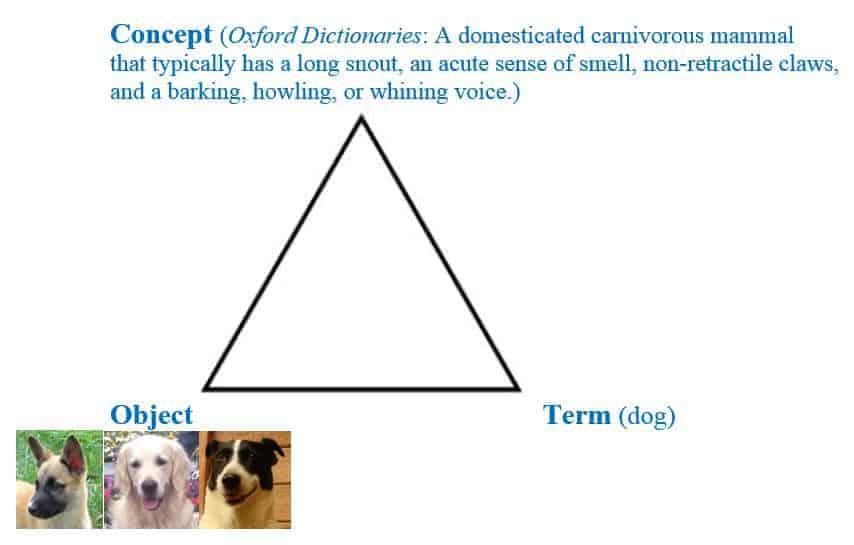How would you define ‘happiness’? According to Oxford Dictionaries, ‘to be happy’ is ‘feeling or showing pleasure or contentment’. But again what is ‘pleasure’ or what is ‘contentment’. Each of us will certainly define happiness in a more detailed way, or especially in a different way. That is because every person has his/her own vision of life. And that is the reason why terminology is so important. Let’s remember the terminological triangle:

Where (Schmitz, 2011):
– the object is “any part of the perceivable or conceivable world”, that is it can be tangible or intangible;
– the concept is the “unit of thinking made up of characteristics that are derived by categorizing objects having a number of identical properties (DIN)” or the “unit of knowledge created by a unique combination of characteristics (ISO)”; concepts can be influenced by culture, the surroundings, personal experience etc. (e.g. when we think of dogs, even if it is something real, we do not think of the same dog, but some of us will think of a black one, others of a white one, while some others of a brown one, and so on); and
– the term is the “designation of a defined concept in a special language by a linguistic expression”, and that can be a word or a symbol.
So what is a ‘definition’? According to Oxford Dictionaries, a ‘definition’ is ‘a statement of the exact meaning of a word, especially in a dictionary’. It is important to specify where (in a dictionary, and also in an institution or company, for example) because everybody has an insight into life according to his/her language; that is according to his/her culture.
That is the reason why abstract concepts, as happiness, can be so difficult to define as they are very much related to our personal experience. However they are not the only kind of words having this particularity: even if we communicate using the same words, we do not always share all the nuances, so every single word needs a definition in order to establish a common starting point.
Consider one term: chess. As stated in Oxford Dictionaries, it is a game; however, the International Olympic Committee (IOC) recognised chess as a sport in 2000. There must be people who disagree on that, but being the IOC a recognised institution at sport level, chess must be treated as such.
Let’s see two examples proving how important terminology is. Similarly to chess, what could be said about the card game bridge? In 2015, the English Bridge Union wanted to classify the game as a sport. To achieve the common definition of the term ‘bridge’ – being or not accepted from a personal point of view -, a High Court judge had to analyse the case, eventually deciding it is not a sport.
The second example about the importance of terminology is about food, in particular, the case of whether toasted sandwiches are hot food or not. Whether sandwiches are considered hot food or not may modify the application of taxes, so it was crucial to define ‘toasted sandwiches’ at a commercial and taxation level.
Can you see how important terminology is? Every person has his/her understanding of things, his/her own definition of concepts; but we have to agree on common definitions, giving terminology and linguistics, in short, communication, the importance it deserves. This will help to avoid misunderstandings and to reach clarity and to share knowledge.
References:
- BBC: Bridge: Judicial review of ‘sport or game’ decision begins, 2015.
- BBC: High Court rules bridge is not a sport, 2015.
- CCH Daily: Subway zero-rate VAT appeal is toast rules Court of Appeal, 2014.
- London Chess Conference: Ten reasons why Chess is a Sport, 2015.
- Schmitz, Klaus-Dirk: Terminology Management in Technical Communication, 2011.
Written by Ana Bennasar
Terminology trainee at TermCoord
